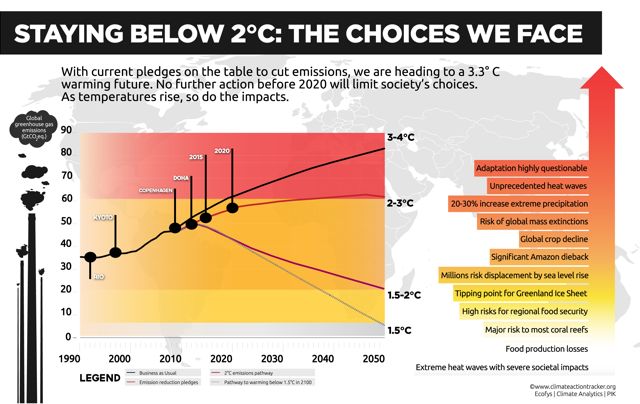The world’s big oil and gas companies could face cuts in market valuation of up to 60% if the world acts to cut carbon emissions, a report by bankers HSBC warned last week. Business Green summarises the report’s findings:
A new report from the banking giant finds that 17 per cent of Norwegian company Statoil’s reserves would become “unburnable” in a world where oil and gas use falls as countries seek to keep carbon concentrations in the atmosphere to 450 parts per million (ppm), the level the International Energy Agency (IEA) estimates is necessary to deliver a 50 per cent chance of limiting long-term temperature rises to 2°C.
HSBC estimates that as much as 6% of BP’s reserves could be at risk, 5% of Total’s, and 2% of Shell’s. But the biggest risk to oil company values could come from reduced demand for oil and gas leading to a fall in prices. Business Green notes:
…the potential value at risk for leading fossil fuel firms could rise to between 40 per cent and 60 per cent of current market capitalisation. BP’s market capitalisation currently stands at around £90bn, compared to Shell’s £147bn, Statoil’s £53bn and BG Group’s £39bn.
The HSBC report is the first acknowledgement by a mainstream financial institution that fossil fuel companies may be over valued in a world where steep cuts in carbon emissions are (one hopes) inevitable. The idea was first mooted in 2011 by the Carbon Tracker Initiative, whose Unburnable Carbon report estimated that as much as 80% of proven fossil fuel reserves would have to remain in the ground. That idea fuelled 350.org’s latest campaign, as Bill McKibben explained in an influential Rolling Stone article last year:
We have five times as much oil and coal and gas on the books as climate scientists think is safe to burn. We’d have to keep 80 percent of those reserves locked away underground to avoid that fate. Before we knew those numbers, our fate had been likely. Now, barring some massive intervention, it seems certain.
Yes, this coal and gas and oil is still technically in the soil. But it’s already economically aboveground – it’s figured into share prices, companies are borrowing money against it, nations are basing their budgets on the presumed returns from their patrimony. It explains why the big fossil-fuel companies have fought so hard to prevent the regulation of carbon dioxide – those reserves are their primary asset, the holding that gives their companies their value.
Stockmarket prices are supposed to factor in — or take into account — all of the assets and risk a company faces, but to date there has been little sign that markets have seriously considered “unburnable carbon” as a liability. The HSBC report may be the first sign of a shift in financial markets, but I suspect it will take clear evidence of concerted global action to cut emissions before markets will run scared of carbon. However, when it happens, the change could be swift. There could be carbon carnage on the trading floors as financial markets ditch fossil fuels for renewables.
There’s a stark lesson there for government and business leadership in Australia and New Zealand — and everywhere else where public money is subsidising the production and use of fossil fuels. Today’s investments in extracting fossil carbon only make sense if you are blind to the climate consequences. Those are now inevitable, and so oil and gas reserves — and especially coal fields — will inevitably become stranded assets, a millstone round the neck of the national and global economy.



 We have frequently
We have frequently  The section of the recent G8
The section of the recent G8
You must be logged in to post a comment.